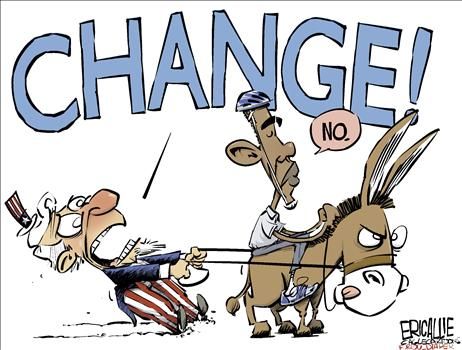
From BarackObama.com (2009):
Get the economy back on track:
President Obama signed legislation to jumpstart our economy, the American Recovery and Reinvestment Act, less than a month after his inauguration. The plan will save or create 3.5 million new jobs, make critical investments in our infrastructure and give 95 percent of working Americans a tax cut.
WASHINGTON (AP) – Vowing to find new ways to stimulate the sputtering economy, President Barack Obama will call for long-term investments in the nation’s roads, railways and runways that would cost at least $50 billion.
The infrastructure investments are one part of a package of targeted proposals the White House is expected to announce in hopes of jump-starting the economy ahead of the November election. Obama will outline the infrastructure proposal Monday at a Labor Day event in Milwaukee.
While the proposal calls for investments over six years, the White House said spending would be front-loaded with an initial $50 billion to help create jobs in the near future.
The goals of the infrastructure plan include: rebuilding 150,000 miles of roads; constructing and maintaining 4,000 miles of railways, enough to go coast-to-coast; and rehabilitating or reconstructing 150 miles of airport runways, while also installing a new air navigation system designed to reduce travel times and delays.
Obama will also call for the creation of a permanent infrastructure bank that would focus on funding national and regional infrastructure projects.
Correct me if I’m wrong, but doesn’t this new “stimulus” that can’t be called “stimulus” sound amazingly similar to the one that has already failed miserably?
Officials said this infrastructure package differs from the stimulus because it’s aimed at long-term growth, while still focusing on creating jobs in the short-term.
Wary of the public’s concern over rising deficits, the administration insists a second stimulus plan, similar to last year’s $814 billion bill, is not in the works.
It just sounds like it.
But if we change the name in a very Orwellian fashion this failed duck is not a duck so this stimulus is not a stimulus.
And a permanent Bank of The United States to boot. A new cash cow. After all, who could be against an “infrastructure” bank?
Me.
***********************************
LET THEM EAT CREDIT!
It’s interesting why behavior that we readily recognize, on an individual level, as undesirable, we routinely promote and accept as government and social policy.
What rational person would suggest that being detached from reality is a good thing?
Or what rational person does not want good information when making important decisions?
But increasingly we live in an environment, created by government driven policies, in which the picture of reality we have is false, and the information available to us for making routine decisions is distorted.
University of Chicago economist Raghuram Rajan demonstrates this problem in what he calls “let them eat credit.”
According to Rajan, we have a big problem at the lower end of our income spectrum. Low end incomes not only are languishing, but adjusted for inflation, are dropping. From 2002 to 2008, real wages for the top ten percent of earners increased, but for everyone else they dropped.
What to do?
Rajan points out that the real culprit is education. As the economy gets increasingly sophisticated, the penalty for lack of education gets greater. But we’re failing to deliver this needed education to lower income Americans.
Core to the problem, Rajan argues, is that politicians are more interested in being popular than solving problems. They’d rather offer free money in the form of subsidies and easy credit to low wage earners than take on real problems.
Programs like subsidized mortgages, which contributed much to the housing bubble, make life look artificially cheap and reduce the sense of immediacy regarding the need to get educated.
The rate of U.S. home ownership increased from 1995 to 2005 from 65% to 69%. Over the same period of time home prices doubled, before everything fell apart.
As reported by Peter Wallison of the American Enterprise Institute, in 1992 government backed lending enterprises, Fannie Mae and Freddie Mac, were directed to “promote affordable housing” and to do this by enabling down payments of less than 5% and approving credit for borrowers with shaky credit history.
Through the 1990s and 2000s HUD continued to push Fannie and Freddie to relax standards, requiring them, according to Wallison, “to buy increasing numbers of subprime and other risky mortgages.”
The faulty assumption behind all this, which we’ve learned the hard way, is that politicians think they can use taxpayers and the money printing press as a bottomless pit of funds to promote government schemes.
Many low income families, bought homes they couldn’t afford. Not just because of lying mortgage brokers, but because the whole artificial reality that distorted prices and credit was created by government policy. (Now the Government owns 80% of Fannie & Freddie and around 70-80% of all mortgages are written under Fannie and Freddie so has anything been learned or are we just insane?)
It’s hard to find a place to turn where we don’t deal with a reality distorted by government.
We’re all concerned about runaway costs of health care and health insurance. What’s behind it?
In 1960, 50% of our health expenditures were out of pocket and 50% were OPM (Other People’s Money – Insurance, Employers, Government).
Today, 12% of our health care expenditures are out of pocket and 88% are Other People’s Money.
So what was the solution: National Health Care! Health Care run by the Government!
According to Harvard economist Robert Barro, the current persistent high unemployment rate, helping drag out this recession, is traceable to the unprecedented extension of unemployment benefits from the normal 26 weeks to almost two years. The argument that we are currently in unchartered territory and must do the unusual is not true.
Barro points out that unemployment in the 1982 recession reached 10.8% – higher than today.
The perhaps not so funny joke that neurotics build castles in the air and psychotics move into them is worth thinking about.
The ability to succeed is predicated on both freedom and having good information on which to make decisions.
As we distort, through government policies, reality around us, and citizens increasingly get bad information for matters about which they have important decisions to make, we’re not going to recover. (Star Parker)

Because recovery mean less people dependent on them.
Sure they want to appear to give a crap because appearing not to or looking like you’re failing is also not desired.
So you have to look and sound like you’re succeeding and give every that false sense of reality that works for you.
Reality is an overrated and under-appreciated, well, reality.
One Question: Hows that “War on Poverty” that was started over 40 years ago going exactly? Won yet?


No comments:
Post a Comment